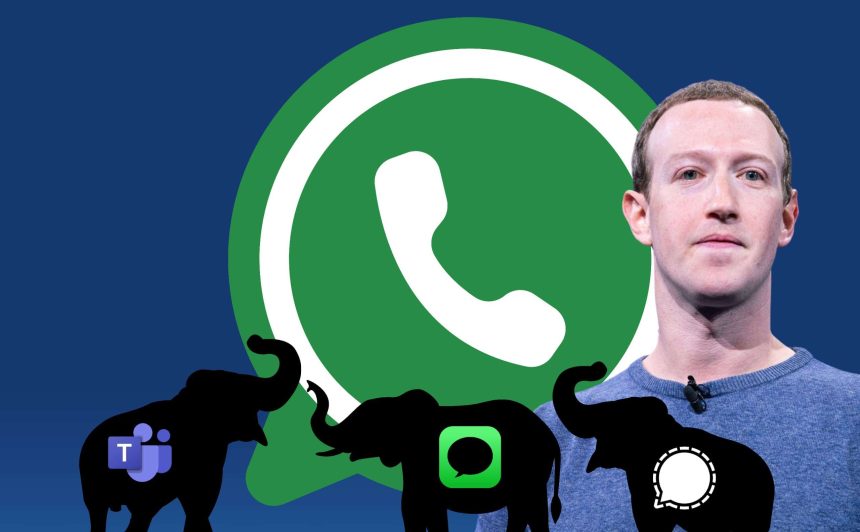Following the U.S. House of Representatives’ decision to ban WhatsApp from government-issued devices, citing data transparency and security concerns, a growing number of users—both institutional and individual—are reconsidering their default messaging apps.
While WhatsApp remains one of the most widely used platforms globally, questions around metadata handling, spyware vulnerabilities, and closed-source architecture are pushing users toward alternatives that offer verifiable security and institutional trust.
Here’s a closer look at three of the most prominent contenders in 2025: Signal, iMessage, and Microsoft Teams—each serving different user needs but with a common thread: security-first design.
1. Signal: Privacy Built Into the Code
Launched in 2014 by Moxie Marlinspike and now operated by the non-profit Signal Foundation, Signal has become the poster child for privacy-first messaging.
The app is open source, meaning anyone can inspect its code for vulnerabilities. More importantly, Signal uses the Signal Protocol, a cryptographic system widely regarded as one of the most secure in the world—and even adopted by WhatsApp and Facebook Messenger for their own encrypted chats.
As of early 2025, Signal has over 50 million active users globally, with spikes in adoption often triggered by data breaches or bans of other platforms. It retains minimal metadata and does not store messages on its servers, reducing the attack surface for third-party access.
Signal is now recommended by cybersecurity professionals, journalists, and even whistleblowers. In fact, Edward Snowden and Jack Dorsey have publicly endorsed its use.
2. iMessage and FaceTime: The Apple Ecosystem’s Fortress
Apple’s iMessage and FaceTime services are built into all iOS and macOS devices and offer end-to-end encryption by default. While not cross-platform like Signal, iMessage enjoys strong adoption, especially among professionals and enterprise users already in the Apple ecosystem.
By 2024, Apple’s Messages app had an estimated 1.3 billion monthly active users, according to Statista. While not every message is encrypted (for example, when texting non-Apple users), Apple does not store the encryption keys for iMessage conversations, making it difficult for third parties—including Apple itself—to access content.
However, Apple has drawn scrutiny in the past for its closed-source architecture, which makes it difficult for external auditors to verify its claims. Still, for users within the Apple universe, iMessage remains a reliable and secure alternative to third-party apps like WhatsApp.
3. Microsoft Teams: Enterprise-Grade Security at Scale
While not a messaging app in the traditional sense, Microsoft Teams has emerged as a leading communication platform for businesses, governments, and large institutions. It integrates messaging, voice/video calls, document sharing, and collaboration tools—backed by Microsoft’s enterprise-grade security.
Teams had over 320 million monthly active users by late 2024, and its usage has expanded beyond enterprise into education, healthcare, and public institutions.
With data encryption at rest and in transit, identity and access management, and compliance certifications (like ISO/IEC 27001), Teams is often approved for use in sensitive environments.
For government and enterprise users transitioning away from WhatsApp, Teams offers auditability, admin controls, and integration with broader security frameworks like Microsoft 365 Defender.
The ban on WhatsApp by the U.S. House may seem like a one-off decision, but it reflects a growing discomfort with platforms that prioritize user growth over user transparency.
While WhatsApp does offer end-to-end encryption, its ownership by Meta—combined with past controversies involving metadata sharing and spyware attacks—continues to fuel distrust among security-conscious users.
Talking Points
Data breach or its potential is a serious issue. And, the US House of Representatives’ decision to ban WhatsApp from government-issued devices highlights the growing concerns about data transparency and security in the digital age.
In Africa, we may want to ask ourselves: Is our dear Africa safe? From an innocent wife sharing nudes with her husband working and residing in a distance country to a young student sharing his account password with parents. Is everything well with data security?
At Techparley, we believe, this development should serve as a wake-up call for users in Africa to prioritize digital security and consider the implications of using messaging apps that may compromise their data.
So, while Signal, iMessage, and Microsoft Teams are emerging as prominent alternatives, are they all breach-proof as well?
From cybersecurity stand point, do they truly offer end-to-end encryption, open-source architecture, and robust security features that can provide users with greater peace of mind?
It’s time to stop believing PR. It’s time to start probing. Also, what can WhatsApp do to regain user trust?
It is not too much to ask for. Meta, the parent company of WhatsApp, is a business that makes millions of dollars annually.
They must do the needful because a singular breach can have far-reaching implications for businesses, governments, and individuals.





